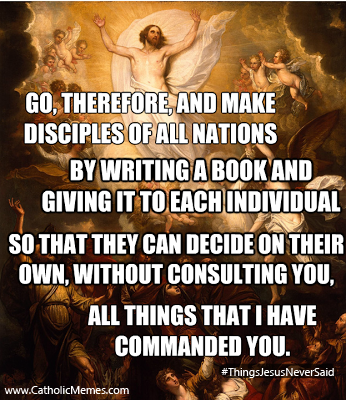LOL! As if that's a bad thing... :) Although certainly it is in the eyes of many, but that's really of no real consequence. Calvinists and Catholics really aren't far apart theologically on the whole. The core beliefs of the Roman Catholic Church are found in the Nicene Creed, which dates to 325 A.D., and any good Calvinist would say the same thing. But, Calvinists (like John Calvin, and Augustine centuries before him, but not because of either one):You’re a Calvinist – that’s what I figured.
1.) identify Christ and Christ alone as the Church's Head (as Paul says in Ephesians 1:22, 4:15, 5:23; Colossians 1:18, 2:10, 2:19)
2.) reject the notion that Mary acts as a mediator between God and man, that Christ is that Mediator (1 Timothy 2:5; Hebrews 8:6, 9:15, 12:24)
3.) reject the idea of making prayer and supplication to Mary for the same reason as #2 above and maintain that praying to the dead is not a practice supported by Scripture
Interesting. Was she a Catholic and became a Calvinist, or were you a Calvinist and became a Catholic. I know of folks who have traveled both paths; it's not a big jump either way... in most things.My sister is a Calvinist – and she also doesn’t like to identify as one.
You disagree, I get it. :) As I said, your premise is wrong; Christ Himself as the Head of His Church (see point 1 above) is the "Original Tree." Actually, I would agree if and only if by Catholic Church you would recognize that 'catholic' merely means universal and as such universally includes all those whom God has called "out of darkness into His marvelous light," as the apostle Peter said in 1 Peter 2:9, and are therefore "in Christ... and walk according to the Spirit," as the apostle Paul says in Romans 8:1-4 and Ephesians 2, regardless of affiliation with any one group of folks. But you refuse to do that.YOU defined “denominations” as:
“Denominations are recognized autonomous branches of the visible Christian Church.”
Since the Catholic Church is the Original Tree from which Protestantism splintered – then it CANNOT be a denomination – per YOUR definition.
You misunderstand ~ or refuse to acknowledge ~ what the difference between Christ's invisible Church, which includes only God's elect, those whom He has called, which we cannot fully know at any point in this life) and the visible church (any visible Bible-believing/preaching congregation) is.PRIOR to the Protestant Revolt – the Catholic church WAS the visible Church.
As I have said, you're welcom to think what you want to think, and certainly don't need my permission or anyone else's to do so. :)I think you're missing the point of what Jesus was saying.to Saul in Acts 9.
You can if you want, but I would not characterize it as "recruiting." In Acts 9, Luke documents Paul's conversion experience, which occurs in each of us subsequent to the Lord issuing to us His inward call by His Spirit. This is Paul's born-again experience. But I would agree ~ although I don't think this is what you are saying ~ that spiritually speaking, inasmuch as Paul was persecuting the church, he was doing it to Christ... in the same manner as what Christ says about believers and unbelievers, respectively, in Matthew 25, as I said... and really more identifying up to that point with unbelievers as referenced by Christ in Matthew 25:42-45.He was recruiting him at that moment...
Okay, but separation from what, BreadOfLife? Now, that's a rhetorical question... :) Martin Luther, the man who started the Reformation, thought ~ and he was right ~ that the Catholic Church was abusing its power in some egregious ways ~ including for political and self-profiteering reasons ~ and had some really bad theological beliefs (see above). We can see this in his final statement at his "trial," in which he was commanded to recant his statement (the 95 theses and other writings and teachings):The very HEART of the Protestant Revolt was separation. The entire movement was born of divorce.
“My conscience is captive to the Word of God. Thus I cannot and will not recant, because acting against one’s conscience is neither safe nor sound. Here I stand; I can do no other. God help me.” (Martin Luther, Diet of Worms, 1521)
Well, he/she does. As I pointed out, we know believers and unbelievers by their fruit. So I agree, but as I've said and will continue to say... I disagree with your opinion of who His Church is. :)And THAT person would know His Church.
Ohhhh... yes... :) Today's Catholic church is incredibly divergent. Respectfully, to deny this is a denial of reality...NOT quite . . .
That's a very Pharisaical statement... and a shame that they would be labeled as such.There are some Catholics who have issues with some doctrine – and they are dissenters.
Well that's not limited to Protestants; a large number of Catholics also "flatly reject certain Catholic doctrines." :) As a group, these people ~ the believing ones anyway ~ recognize themselves to be part of Christ's one catholic, apostolic church. :)There are others who flatly reject certain doctrines. As I stated before – those are called Protestants.
It is. They may not have different names for themselves, but that matters not.But it’s NOT true that we are as “divergent” as Protestantism.
Right, and none of those few examples are homogenous themselves, by any stretch of the imagination.There ARE groups like the Old Catholic Church, the Irish Catholic Church, American Catholic Church, American National Catholic Chur, etc.
I would encourage and exhort you, BreadOfLife, to identify Christ and Christ alone. If you say you do, then great, but my encouragement and exhortation then would be to... change your mind, and thus your actions and rhetoric, to match. :)
Grace and peace to you, BreadOfLife.
Last edited:


